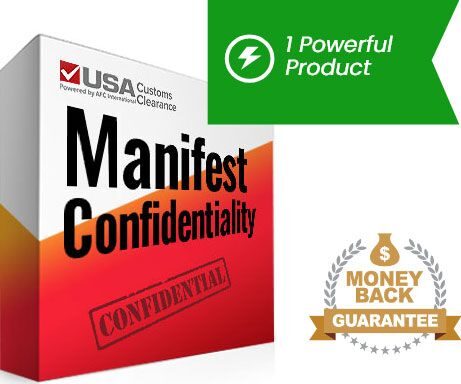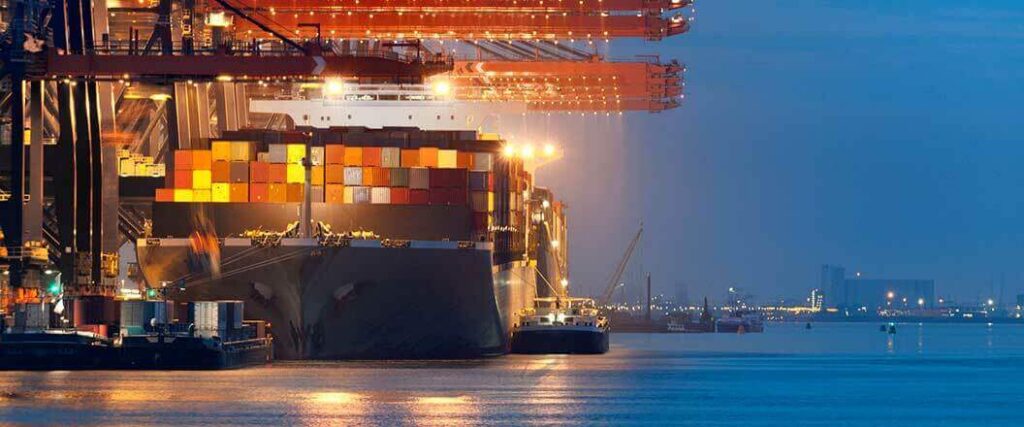
If manifest confidentiality isn’t on your to-do list as an importer, it needs to be. At any given moment, your business competitors could be finding out who your suppliers are, what ship your merchandise is on, and how much you paid for it all. Not fair, you say? Then you need to keep reading to find out how manifest confidentiality can protect your investments.
U.S. Customs and Border Protection (CBP) provides an Electronic Vessel Manifest Confidentiality request form to protect import data from access. Without the form, it’s possible for over 25 data points about a shipment to become public record. However, access can be legally denied when an importer or shipper submits a request for confidential treatment.
Read ahead for more information on manifest confidentiality to protect your company’s supply chains.

Your Shipping Manifest is Public and Available To Your Competitors.
Purchase Your Manifest Confidentiality and Protect Your Business!
Transparency in the shipping industry depends on different factors. Are import records public? The answer is a little more complicated than a simple yes or no.
You can find details of import records that are available to the public in a simple web search. Information considered public knowledge includes HTS codes and ports of arrival.
CBP bases its rules on information disclosure on the Freedom of Information Act (FOIA) passed in 1967. Privacy statute 19 CFR 103.31 allows the release of information on ship manifests and import statistics. Thankfully, there is a loophole where information may remain confidential if asked.
Requests for more detailed information get sent to CBP through Importer Trade Activity (ITRAC) Requests. ITRAC supplies information on:
All of these and more can become publicly available from one day to the next.
The good news is that there is a way to keep that information private and give your business a needed edge.
For information on import documents, check out the article, “A Beginners Guide to Documents Needed for Export and Import”.

All ocean going container vessels are required to keep detailed records of their cargo. This vessel manifest is commonly referred to as a shipping or customs manifest. A shipping manifest lists information on cargo, passengers, and crew for a ship, plane, or vehicle.
U.S. port authorities and the CBP keep records of all ship manifests. Before any ship, cargo or otherwise, can dock in a U.S. port, it must submit this manifest for approval.
In the shipping industry, a vessel manifest will list all goods provided by the Bill of Lading (BoL) for every on-board order. The BoL is specific to the goods loaded in one port and scheduled for delivery at a single destination.
A BoL is a transport agreement issued by the main carrier to a shipper.
It serves three purposes:
A BoL contains more detailed information that isn’t on the shipping manifest, such as:
As a legally binding contract, all details included in the BoL help in preventing fraud and asset theft. If necessary, it may be used in court to settle legal disputes. This is the document that most competitors want to see because of all the product details it’s required to list.
Yes, a ship’s manifest is subject to the same FOIA laws as other import records.
The majority of companies and individuals seeking insider knowledge on international trade specifically include shipping manifests as part of the request. Some of these data mining companies will then turn around and dump the information into a database where the public can access it, usually for a fee.
Depending on how frequently the requests are made, ship manifests can be made public within weeks or days of arriving in port.
Like other shipping information collected by U.S. ports, a BoL will be released when requested by accredited institutions. These institutions may make that information available to the general public.
A BoL is hidden through the same process as a shipping manifest. BoLs are included in the items kept confidential when a business submits an electronic vessel manifest confidentiality request.
Confidentiality lasts for two years, at which point it must be renewed. At this time, there isn’t a way to set up automatic renewals through CBP. However, you can enter into an agreement with a Customs Brokers to renew on your behalf.

Manifest confidentiality is the CBP’s shorthand for an Electronic Vessel Manifest Confidentiality request. Vessel refers to ships specifically because only people using ocean carriers for importing can file for manifest confidentiality.
Air Waybills are protected and unavailable for request by data mining companies. If you are shipping by air, there is no need to file for additional confidentiality.
When importers and shippers file a manifest confidentiality request, the CBP will deny access to any imported cargo records for the specified company.
In May 2020, the CBP established a website to submit electronic vessel manifest confidentiality requests online. You can still make requests by mail or email, but those might take 60-90 days to get processed. Submitting a request through the web platform may cut down the processing time to just 24 hours.
Using the online application has other benefits too. If your company goes by many names or has a name that is often misspelled, it can be included. Applicants can enter every name, common misspelling, or DBA (doing business as) in their request.
Entering name variants improves the chance it will match the one entered through the Automated Commercial Environment (ACE) system.
Manifest confidentiality is important because it protects your business interests. Your competitors can find over 25 different data points about your shipments if your import records become public.
Suppose you have an eCommerce store that sells sportswear. You’ve found a good supplier with excellent pricing. Your eCommerce store offers competitive prices and brings in good business.
Someone wanting to steal business away can use your import records to find your supplier and undercut you on pricing. You lose customers because they are finding your products much cheaper at different sites.
If it happens once, maybe you don’t consider it a big deal. But if it keeps happening, you could see traffic on your eCommerce site keep dropping. No traffic means no customers, and you go out of business.
The same is true of any business, even ones that are brick-and-mortar. The databases where import records and manifests are dumped don’t require a product to have an online listing.
Someone could simply type the name of your store or business into the search. If any of your products were imported under your company name, the record of your suppliers, quantities ordered and even import duties paid are revealed.
Get additional details when you check out, “How to Find Out Where a Company Imports From.”

USA Customs Clearance can help you file a manifest confidentiality request and keep your records private.
Importers and exporters may both file for manifest confidentiality. Freight forwarders and non-vessel operating common carriers (NVOCC) cannot file a CBP confidentiality request.
Requests to hide manifest data can come from:
An importer can choose not to keep the shipper’s information confidential on the form. In that case, the shipper can request for themselves that their name and address be hidden in an outward manifest.
The application process is simple. Consider this step-by-step walkthrough:
Requests sent online are usually processed in 24 hours. Once processed, the CBP will confirm through email or mail that your information is hidden.
Data confidentiality lasts two years from its processing date. The status applies to all ports of entry in the United States. Although the online system processes quickly, it is still recommended to submit renewals 60-90 days before expiring.
The CBP does its best to promise confidentiality for all who request it, but can’t guarantee that the information will never be published.

USA Customs Clearance can help you file a manifest confidentiality request and keep your records private.
The National Archives can be found with a basic web search. Anyone can do it, and it actually has records stretching back to the 1740s. However, most businesses looking to scoop their competitor’s suppliers want something a bit more modern.
Either way, the information in the National Archives is limited. Some records remain protected and can only be released by going through a Freedom of Information Act (FOIA) request. While anyone can submit a FOIA request in general, only authorized company officers may ask for import data.
Requests go through the CBP’s ITRAC system and cost $250-$300 per request. Also needed at the time of request are:
There is a catch though. Once these third-party institutions have the information, anyone willing to pay for the access can see it. eCommerce owners can find high-quality suppliers being used by their competitors. Protecting your product line becomes difficult when anyone might see where you are getting goods from.
Some companies that provide this service are:
The only way to hide information from these companies is through the manifest confidentiality request. Not even the FOIA will allow the information to get released.
Worried about competitors scoping out your suppliers? Let USA Customs Clearance provide you with the tools to protect your investment by filing for Manifest Confidentiality today.
We also offer additional services that protect your imports and help you succeed.
Don’t let your competitors steal the magic of your business away. Reach out to USA Customs Clearance today to protect your product lanes. Call us today at (855) 912-0406 or contact us with your specific requests online.
 Copy URL to Clipboard
Copy URL to Clipboard
Dear Sir or Madam,
I am located in Costa Rica. I will be importing products from China into Costa Rica. Please advise how I can keep my import date and BOL confidential for Costa Rica imports.
Thank you.
Best regards,
Anthony